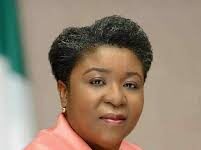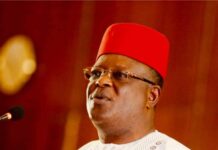COVID-19: Time To Examine Cost Of Governance, By Taiwo Amodu
POLITICS DIGEST – The deadly pandemic, coronavirus, aside its unnerving fatality rate, has equally dealt a blow to the Nigerian mono-cultural economy. The drastic fall in the price of crude oil has caused a corresponding decrease in external reserves and volume of money to be shared by state government.
The Federal Government, in its 2020 Budget, offered $57 as its benchmark for crude oil in the international market. It has since fallen to between 26 and 31 US dollars per barrel in the world market.
For an import dependent economy that earns over 80 per cent from crude oil, the unsavoury development is a big strain on the nation’s foreign reserves.
Sunday Tribune’s checks revealed that the foreign reserves has dropped from $38.34 billion on January 15, to $36.69 billion on February 20.
According to the nation’s apex bank, the Central Bank of Nigeria (CBN), the reserves had been on a steady depletion from $39.8 billion in November 2019 to $39.24 billion on December 13, 2019, also losing $1.26 billion in October 2019 after the foreign reserves fell from $41.76 billion on October 2 to $40.5 billion as of the end of October.
The reserves also dropped by $482.18 million from $45.14 billion as of July 8 to $44.65bn on August 8, 2019.
According to a report, the “CBN’s policy on currency intervention has seen the apex bank introduce billions of dollars into the foreign exchange market to maintain the naira at a stable rate, in an attempt to curb imports and boost local production.”
During the week, the Muhammadu Buhari-led administration, through its Finance Minister, Zaynab Ahmed, released $150 million from the Sovereign Investment Authority, otherwise called Sovereign Wealth Fund (SWF).
According to the Honourable Minister of Finance, the withdrawal from the SWF became compelling in the face of dwindling fall in foreign exchange earnings from oil and its negative impact on the Federation Account.
The minister argued that based on the fiscal assumptions underpinning the 2020 Appropriation Act, monthly Federation Account Allocation Committee (FAAC) disbursements to the federal and state governments were projected at N888.5 billion. She expressed regret that FAAC monthly disbursements had since declined to N716.3 billion in January and N647.4 billion in February 2020, a situation that had affected the amount distributed to the three tiers of government by the Federation Account Allocation Committee.
She said: “Our experience shows that monthly average FAAC receipts must average at least N650 billion for the federal and state governments to meet their current obligations.
“Unfortunately, we project that monthly receipts may decline to below N400 billion over the next three to six months.”
Before her disclosure of $150 million withdrawal from the SWF, the minister had met penultimate weekend with the leadership of the National Assembly to seek legislative approval for N500 billion Intervention Fund to address the deadly CONVID-19 scourge.
Honourable Ahmed said the proposed fund, which would be dedicated to upgrade of existing health facilities in states across the federation, would be pooled from from various special accounts, grants being expected and loans from multilateral institutions.
She said:»What we are proposing is an establisment of a N500 billion COVID-19 Crisis Intervention Fund.
“This Fund that we are proposing, that should be created, will involve mopping up resources from various special accounts that the government as well as the Federation have, to be able to pull this N500 billion.
“Our general view is that this crisis intervention fund is to be utilised to upgrade healthcare facilities as earlier identified.
“The Federal Government also needs to be in a position to improve health care facilities not only in the states but to provide intervention to the states.
“We know that there will be a need for the parliament to agree and approve the taking of loans from these special accounts and we will be coming back with a proposed bill in that regard that will define what the fund will be used for.”
IMF drops hint
The fate of the over $29 billion external loan being sought from China, the Asian giant, hangs in the balance. But the international finance corporation, the International Monetary Fund (IMF), during the week, dropped a hint of a financial bailout for Nigeria.
Read Also:
The IMF Managing Director, Kristalina Georgieva, in a statement, said the multilateral institution was considering assistance to Nigeria under the Fund’s Rapid Financing Instrument (RFI) to help mitigate the dearth in Nigeria’s foreign earnings as a result of sharp decline in price of crude oil and to equally mitigate financial shock from the COVID-19 pandemic.
She said: “the IMF was anxious to help President Muhammadu Buhari in his concrete measures aimed at containing the spread of the virus and its impact, including by swiftly releasing contingency funds to Nigeria’s Center for Disease Control (NCDC) and working on an economic stimulus package that will help provide relief for households and businesses impacted by the downturn.
“To support these efforts, Nigeria’s government has requested financial assistance under the Fund’s Rapid Financing Instrument (RFI). This emergency financing would allow the government to address additional and urgent balance of payments needs and support policies that would make it possible to direct funds for priority health expenditures and protect the most vulnerable people and firms. We are working hard to respond to this request so that a proposal can be considered by the IMF’s Executive Board as soon as possible.”
Cost of governance: Who bells the cat?
At the end of the meeting between the leadership of the National Assembly and the Minister of Finance, both parties agreed to review the benchmark for crude oil from $57 to $30 per barrel. But both the executive and the legislative arms were silent on the deafening agitations by Nigerians for the downward review in cost of governance.
Sunday Tribune’s checks revealed that the 2020 Budget estimate presented to the joint session of the National Assembly last October by President Buhari was increased from N10.33 trillion to N10.50 trillion by the appropriation committees of both chambers before the Appropriation Bill was signed into law. That was after the National Assembly had inserted new projects valued at N264 billion into the budget estimates.
A breakdown of the budget revealed that N560,470,827,235 was budgeted for statutory transfer; N2,725,498,930,000 for debt servicing; N4,842,974,600,640 for recurrent expenditure; N2,465,418,006,955 for capital expenditure; and N2.28 trillion for fiscal deficit.
Apart from its statutory transfer of N128 billion, the legislative arm also appropriated to itself the sum of N37B for the renovation of the National Assembly Complex.
Other agencies of government to receive statutory transfer totaling N565.59 billion included the Universal Basic Education (UBE); N111.79 billion and the National Judicial Council (NJC) with an allocation of N110 billion.
Other beneficiaries of first line charge are the Basic Healthcare Provision Fund (BHCPF) in the Ministry of Health with N44.5 billion, while the Independent National Electoral Commission (INEC) has N40 billion.
Closely following INEC is the North-East Development Commission, which has N38.1 billion and the Public Complaints Commission (PCC) and the National Human Rights Commission (NHRC) has an allocation of N4.7 billion and N2.50 billion, respectively.
Nigerians call for reduction in legislative representation
For the National Assembly, Nigerians have called for a unicameral legislature as against the present bicameral arrangement which they perceive as bloated and a drain on dwindling public fund.
They have equally sighted overlap in functions of some of the existing federal agencies and called for a streamline to reduce recurrent expenditure. A good example is the existence of two anti-corruption agencies, namely the Independent Corrupt Practices and other related offences Commission (ICPC) and the Economic and Financial Crimes Commission (EFCC).
Nigerians have also been presented with heart rending account of staggering sum allocated to the State House Clinic, Presidential Villa. Investigation revealed that N13.59 billion has been budgeted for the State House Clinic in the last five years.
The sum of N3.95 billion, N3.87 billion and N3.20 billion were budgeted in 2015, 2016 and 2017, respectively. Further checks revealed that allocations for 2018, 2019 and 2020 were N1.03 billion, N82344 million and N723 million respectively.
Wife of the President, Aishat Buhari, had, in October 2017, upbraided the Chief Medical Director (CMD) of the State House Medical Center, Dr. Husain Munir, over what she described as poor state of facilities and equipment at the clinic despite yearly budgetary provisions.
A source at the National Assembly, however, told Sunday Tribune that plans were in the offing for a review of the Medium Term Expenditure Framework (MTEF) for 2020 Budget estimates.
“The government is determined to review downward capital projects across ministries, departments and agencies (MDAs) to the tune of 20 per cent.”
Source: Nigerian Tribune

















